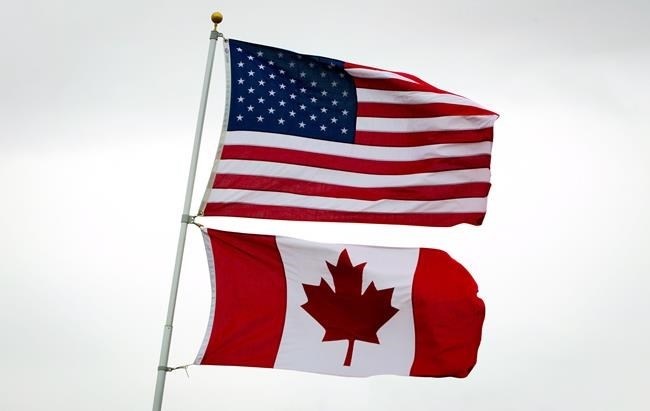
U.S. and Canadian flags fly in Point Roberts, Wash., on Tuesday March 13, 2012. President Donald Trump is confirming that the Canada-U.S. border will be closed "by mutual consent" to non-essential traffic.
Image Credit: THE CANADIAN PRESS/Darryl Dyck
March 18, 2020 - 7:42 AM
WASHINGTON - The Canada-U.S. border will be closed to non-essential traffic in both directions "by mutual consent," President Donald Trump confirmed Wednesday as efforts across the continent to contain the widening COVID-19 pandemic continued to upend daily life in North America.
Trump disclosed the news on Twitter shortly after stock markets opened, following media reports in both countries that said the White House and the federal Liberal government were in talks to find a mutually agreeable way to limit the cross-border spread of the virus without choking off vital lines of commerce.
"We will be, by mutual consent, temporarily closing our Northern Border with Canada to non-essential traffic," Trump tweeted. "Trade will not be affected."
More details were to be disclosed later; the White House coronavirus task force had a news conference scheduled for 10:30 a.m. ET, and the president has been known to make an appearance at those briefings.
Sources in Ottawa say both sides have been in talks to limit travel in both directions across the border without restricting the all-important flow of trade and commerce between the two countries at a time when the global economy is under severe pressure.
Discussions have been focused on determining which essential workers might be exempted — a group that could include mission-critical truck drivers, airline crew members and health-care workers who live and work on opposite sides of the border.
Officials in the Prime Minister's Office said Tuesday there would also likely be a temporary exemption for Canadians who winter in the southern U.S. in order to give them time to get home.
On Tuesday, Deputy Prime Minister Chrystia Freeland made it clear that the government, which has for the moment exempted U.S. citizens from its own ban on foreign nationals, has been preoccupied with finding a mutually agreeable solution to the border conundrum.
"Nearly 200,000 people cross that border every day and that border and that traffic that goes across that border is literally a lifeline for both the Canadians and the Americans on both sides of that border," Freeland said.
"We get our groceries thanks to truckers who drive back and forth across that border. Very urgently needed medical supplies and medicines go back and forth across that border. And essential workers go back and forth across that border every day. So it is a unique relationship for Canada and it's important for us in handling our situation on the border to be sure that we act to get things right."
Health Minister Patty Hajdu, whose Thunder Bay-Superior North riding in Ontario is near the Minnesota border, cited a number of examples of what the government would consider non-essential travel, such as shopping trips by residents of border communities — "things that people have taken for granted in a border town for a very long time."
Trump, whose first term was often marked by a combative relationship with Canada as the U.S. sought to renegotiate the North American Free Trade Agreement, sounded a far more conciliatory note when he spoke publicly on Tuesday.
"The relationship is outstanding with both (Canada and Mexico) — outstanding," Trump said, citing in particular NAFTA's replacement, the U.S.-Mexico-Canada Agreement, which Canada finally approved late last week before temporarily shutting down Parliament.
Citing Trump administration sources, the New York Times reported Tuesday that asylum-seekers and others trying to cross the southern border illegally would be turned away immediately in an effort to protect border agents and keep COVID-19 out of U.S. detention facilities. U.S. citizens and green-card holders would still be allowed to enter the country, the Times said.
Dan Ujczo, a trade lawyer in Columbus, Ohio, who specializes in Canada-U.S. issues, said business and trade interests in the two countries, along with governments at every level, have been working on solutions ever since the terrorist attacks of Sept. 11, 2001, exposed the absence of suitable contingency plans.
Since then, so-called "trusted trader" programs like Free and Secure Trade and Partners in Protection have advanced the idea that whatever the circumstances, cross-border commerce must be allowed to continue, he said.
"Companies enrolled in these programs likely will have continued access to ensure cross-border trade."
This report by The Canadian Press was first published March 18, 2020.
News from © The Canadian Press, 2020